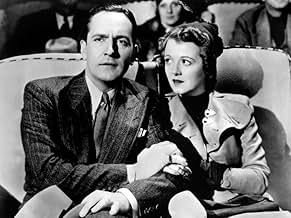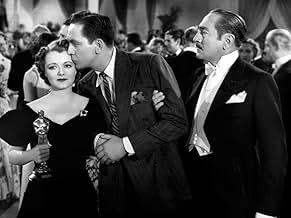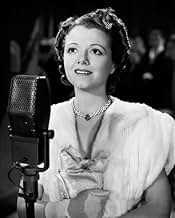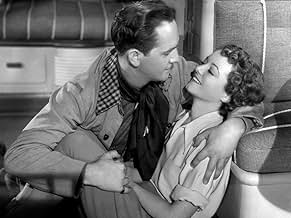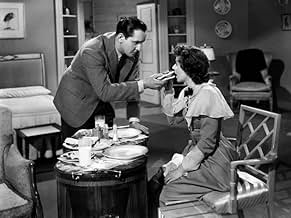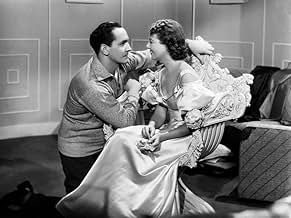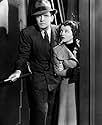IMDb RATING
7.3/10
12K
YOUR RATING
Young Esther Victoria Blodgett comes to Hollywood with dreams of stardom and achieves them only with the help of alcoholic leading man Norman Maine, whose best days are behind him.Young Esther Victoria Blodgett comes to Hollywood with dreams of stardom and achieves them only with the help of alcoholic leading man Norman Maine, whose best days are behind him.Young Esther Victoria Blodgett comes to Hollywood with dreams of stardom and achieves them only with the help of alcoholic leading man Norman Maine, whose best days are behind him.
- Won 1 Oscar
- 7 wins & 7 nominations total
Guinn 'Big Boy' Williams
- Posture Coach
- (as Guinn Williams)
Jean Acker
- Woman at Preview
- (uncredited)
Eric Alden
- Niles' Assistant
- (uncredited)
Irving Bacon
- Station Agent
- (uncredited)
Jane Barnes
- Waitress #1
- (uncredited)
Vince Barnett
- Otto
- (uncredited)
Clara Blandick
- Aunt Mattie
- (uncredited)
Featured reviews
I believe this as one of the most beautiful pictures I have ever seen. I enjoyed the story, the dialog and above all I enjoyed the atmosphere and the actors. All of them are great but to me Fredric March is outstanding.
Norman/Alfred is a wonderful character: frail, undignified, touchy, weak and able to love Vicki/Esther so much, with all his heart.
Fredric March brings all of it on the screen, providing one of his best performances here.
If you would like to become an actor, I believe you should watch this movie and Mr. March's way of acting. Pay attention to his eyes, his hands, his face and his moves, especially when he interrupts his wife thanking everybody for the Oscar she got and claims he deserves three statues for the worse performances.
He is overcome by himself and starts dying. I just shivered.
To me, this version can't be compared to its remakes. The allure and the fascination of Hollywood have been perfectly represented here, together with an unpleasant and creepy feeling of emptiness.
Norman/Alfred is a wonderful character: frail, undignified, touchy, weak and able to love Vicki/Esther so much, with all his heart.
Fredric March brings all of it on the screen, providing one of his best performances here.
If you would like to become an actor, I believe you should watch this movie and Mr. March's way of acting. Pay attention to his eyes, his hands, his face and his moves, especially when he interrupts his wife thanking everybody for the Oscar she got and claims he deserves three statues for the worse performances.
He is overcome by himself and starts dying. I just shivered.
To me, this version can't be compared to its remakes. The allure and the fascination of Hollywood have been perfectly represented here, together with an unpleasant and creepy feeling of emptiness.
When you see this masterpiece, remember that more than 65 years have passed since it debuted on the big screen. How many contemporary films will dazzle and delight in 2065?
Sure, we have seen this story before, but this was the first incarnation. Sure all films are in color today, but notice the rich, full-rigged use of color here, only a decade after talkies began. Dialogue sound familiar, well many of the lines originated here (thanks Dorothy Parker).
First caught this in the movie theatre around 1975 as this David O. Selznick production had been out of circulation. Judy Garland's troubled but ultimately engrossing and hugely entertaining remake was already familiar to me. So how does a classic compare to its first version. To me, it is one of the 1930's masterworks.
How perfect to cast Janet Gaynor in the role, an Oscar winner herself at 20 --- that child-like voice unforgettable. Fredric March, like Gaynor already a star and early Oscar recipient, world weary and helpless. The art deco, lavish production, haunting music, and scene after scene of "behind the scenes Hollywood", well they sure worked for me. "Kitsch" an old friend labeled it, but to me, memorable.
I love watching this movie --- hope you enjoy it as well.
Sure, we have seen this story before, but this was the first incarnation. Sure all films are in color today, but notice the rich, full-rigged use of color here, only a decade after talkies began. Dialogue sound familiar, well many of the lines originated here (thanks Dorothy Parker).
First caught this in the movie theatre around 1975 as this David O. Selznick production had been out of circulation. Judy Garland's troubled but ultimately engrossing and hugely entertaining remake was already familiar to me. So how does a classic compare to its first version. To me, it is one of the 1930's masterworks.
How perfect to cast Janet Gaynor in the role, an Oscar winner herself at 20 --- that child-like voice unforgettable. Fredric March, like Gaynor already a star and early Oscar recipient, world weary and helpless. The art deco, lavish production, haunting music, and scene after scene of "behind the scenes Hollywood", well they sure worked for me. "Kitsch" an old friend labeled it, but to me, memorable.
I love watching this movie --- hope you enjoy it as well.
Janet Gaynor plays Esther Blodgett beautifully, a girl who leaves for Hollywood with dreams of film magazines and the blessing of her granny. Once there she finds it tough-going until meeting Norman Maine (Fredric March) at a party. We've already seen Norman drunk at a theatre but here he charms Esther and actually gets her into the movies before marrying her and watching his own career crumble. March is excellent in this, and the look of the film is surprisingly modern with its lovely technicolor and gadgets (I particularly like the shower in the motor home Esther and Norman take on honeymoon). Esther's move to become star Vicki Lester, Oscar-winning actress, is unbelievable but as her real-life tragedy unfolds, compelling. And who can stay dry-eyed at the end? Remade with music and Judy Garland in 1954 (very well) but this first version is a jewel amongst other 30s classics.
this is the first version of this movie made,and the only version i have seen so far.i liked it.i thought it was touching and ironic,and also tragic.it basically tells what the movie business can do to you,and the sacrifices that are made.it also shows how disposable the industry and the people in it are.as long as you are the flavour of the week,everything seems fine.but when you're no longer useful,reality hits and things can come crashing down.that's what basically happens in this story.it's an indictment(ironically)of the movie industry,however subtle.regardless,i thought it was well done.the acting by the tow leads,Janet Gaynor,and Frederic March,as well as the supporting performances,are terrific.i also thought the writing was very good,and the movie flows very well.for me,A Star is Born gets an 8/10
Fredric March gave a magnificent performance, probably the best of his career, as Norman Maine, the actor whose career is in the descendant as that of his wife, Vikki Lester, is in the ascendant in this, the first 'official' version of "A Star is Born", (the 1932 film "What Price Hollywood" roughly told the same story). March displays just the right degree of brashness, of knowingness, and a combination of ego and a real actor's almost complete lack of ego. It's a miraculous piece of work.
As Lester, Janet Gaynor is touchingly blank but the star quality she is meant to display seems conspicuously absent; (in the 1954 musical remake Judy Garland was almost too much a star). It seems inconceivable that she could eclipse March on screen (even with his drinking). If Lester is a star and possibly a great actress Gaynor keeps the secret to herself.
The script for this version was partly written by Dorothy Parker and Alan Campbell and it shows. It's an acerbic and, at times, savage movie about the movies, quite cynical for a major studio picture of it's day. It is very well directed by William Wellman who draws first-rate performances from the supporting cast, in particular Lionel Stander as a heartless, slime-ball studio hack. This remains the best of the three versions to come thus far.
As Lester, Janet Gaynor is touchingly blank but the star quality she is meant to display seems conspicuously absent; (in the 1954 musical remake Judy Garland was almost too much a star). It seems inconceivable that she could eclipse March on screen (even with his drinking). If Lester is a star and possibly a great actress Gaynor keeps the secret to herself.
The script for this version was partly written by Dorothy Parker and Alan Campbell and it shows. It's an acerbic and, at times, savage movie about the movies, quite cynical for a major studio picture of it's day. It is very well directed by William Wellman who draws first-rate performances from the supporting cast, in particular Lionel Stander as a heartless, slime-ball studio hack. This remains the best of the three versions to come thus far.
Did you know
- TriviaThe first all-color film nominated for an Academy Award for Best Picture.
- GoofsThe Night Court Judge refers to the "commonwealth" of California, but California isn't one of the states with commonwealth status. The judge should have referred to the "state" instead.
- Quotes
Grandmother Lettie: If you've got one drop of my blood in your veins, you won't let Mattie or any of her kind break your heart, you'll go right out there and break it yourself.
- Alternate versionsAlso available in black and white
- ConnectionsEdited into What's Cookin' Doc? (1944)
- SoundtracksCalifornia, Here I Come
(1924) (uncredited)
Music by Joseph Meyer
(variations in the score as Esther arrives in Hollywood)
Details
- Release date
- Country of origin
- Language
- Also known as
- Nace una estrella
- Filming locations
- Production companies
- See more company credits at IMDbPro
Box office
- Budget
- $1,173,639 (estimated)
- Runtime
- 1h 51m(111 min)
- Aspect ratio
- 1.37 : 1
Contribute to this page
Suggest an edit or add missing content


